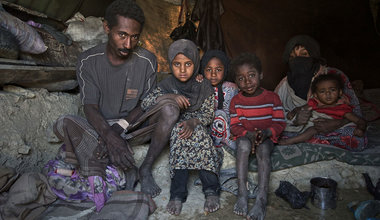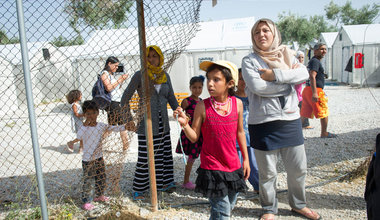UN agency chief urges world to 'step up' as refugee numbers outpace resettlement spots
 Against the backdrop of increasing refugee numbers around the globe, fuelled by crisis and insecurity, and an ever widening gap in places to resettle them, the top United Nations official dealing with refugee issues has called on governments to “step up” and deliver places for refugees in line with the commitments they have made.
Against the backdrop of increasing refugee numbers around the globe, fuelled by crisis and insecurity, and an ever widening gap in places to resettle them, the top United Nations official dealing with refugee issues has called on governments to “step up” and deliver places for refugees in line with the commitments they have made.
“The fact is global resettlement needs today far outweigh the places made available by governments by a factor of 13 to one, despite more countries taking part in the programme and an increase in private sector and community involvement,” said Filippo Grandi, the UN High Commissioner for Refugees Filippo Grandi, at the opening of the UN agency's annual resettlement consultations in Geneva, Switzerland.
Recalling the New York Declaration, adopted by the 193 UN Member States, in September last year save lives to protect rights and share responsibility on the global issue, Mr. Grandi added:
“The Declaration was a milestone in global solidarity with refugees and the mainly developing countries which host almost 9 in 10 of them. But true sharing of responsibility requires places for refugees in third countries on a scale in line with the needs.”
“We need urgent action to get there,” he underscored.
In the Declaration, and the annexed Comprehensive Refugee Response Framework (CRRF), governments committed – amongst other objectives – to work on increasing resettlement places and other legal pathways for admission of refugees on a scale that would match the annual resettlement needs identified by UNHCR.
According to estimates, close to 1.2 million refugees need resettling globally, but only 93,200 places in resettlement countries are expected to be available this year – 43 per cent fewer than in 2016.
Refugees in need of resettlement are those people identified by UNHCR as having particular problems in the countries where they have sought refuge because their life, liberty, safety, health or other fundamental rights are at risk.
Last year, the Office of the UN High Commissioner for Refugees (UNHCR) submitted more than 162,500 refugees for resettlement – the highest number in 20 years – and more than 125,800 started new lives in third countries.
Also last year, the number of third countries offering resettlement grew to 37, with some European governments setting up programmes for the first time and Argentina and Brazil, amongst others, making new commitments to resettle Syrian refugees.
Similarly, to assist the new resettlement states, UNHCR and IOM launched a support mechanism with support from donors. Community and private sponsorship programmes also increased.
“Despite the rhetoric against refugees in some quarters we have also seen an outpouring of good will, with ordinary citizens sponsoring refugees to live in their countries, inviting them into their homes and helping them to find jobs,” Mr. Grandi added, urging all partners to support ways to provide additional places for refugees.
“Resettlement places not only help those refugees who face extreme difficulty in their first country of asylum, but are an important gesture of solidarity with countries hosting large numbers of refugees,” he said.
 ONU
ONU







